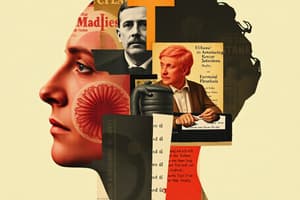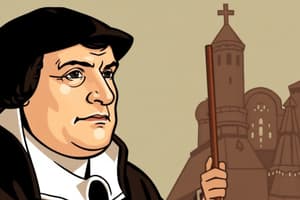Podcast
Questions and Answers
Which of the following sacraments are recognized in both the Catholic Church and Protestant Reformation?
Which of the following sacraments are recognized in both the Catholic Church and Protestant Reformation?
- Confession
- Marriage
- Baptism (correct)
- Communion (correct)
The Protestant Reformation led to a unified view of Christianity among all Europeans.
The Protestant Reformation led to a unified view of Christianity among all Europeans.
False (B)
What major factor led to the discontent that fueled the Protestant Reformation?
What major factor led to the discontent that fueled the Protestant Reformation?
Church corruption
Calvinism strongly emphasized the idea of __________, which suggests that God has already determined who will be saved.
Calvinism strongly emphasized the idea of __________, which suggests that God has already determined who will be saved.
Match the following figures with their contributions during the Protestant Reformation:
Match the following figures with their contributions during the Protestant Reformation:
What is the main idea of John Calvin's theology?
What is the main idea of John Calvin's theology?
Calvinism promoted equal rights for women compared to the societal norms of the time.
Calvinism promoted equal rights for women compared to the societal norms of the time.
What role did Calvinism play in Geneva's social structure?
What role did Calvinism play in Geneva's social structure?
John Calvin believed that individuals have no free will and that their fate is decided by __________.
John Calvin believed that individuals have no free will and that their fate is decided by __________.
Match the following events with their significance in the English Reformation:
Match the following events with their significance in the English Reformation:
Which of the following features is characteristic of Calvinism?
Which of the following features is characteristic of Calvinism?
Calvinism encouraged a chaotic lifestyle among its followers.
Calvinism encouraged a chaotic lifestyle among its followers.
How did the Protestant movement expand in relation to Calvinism?
How did the Protestant movement expand in relation to Calvinism?
What is the concept of 'Sola Fide' associated with Martin Luther?
What is the concept of 'Sola Fide' associated with Martin Luther?
Martin Luther believed that all believers are equal and could serve as priests.
Martin Luther believed that all believers are equal and could serve as priests.
What significant event did Martin Luther initiate on October 31, 1517?
What significant event did Martin Luther initiate on October 31, 1517?
Martin Luther argued that __________ should not be a priority for clergy at the time.
Martin Luther argued that __________ should not be a priority for clergy at the time.
Match the following individuals with their contributions to the Reformation:
Match the following individuals with their contributions to the Reformation:
Which of the following best describes Calvin's idea of predestination?
Which of the following best describes Calvin's idea of predestination?
The English Reformation was influenced solely by Martin Luther's ideas.
The English Reformation was influenced solely by Martin Luther's ideas.
What role did women play in Calvinism during the Reformation?
What role did women play in Calvinism during the Reformation?
In Geneva, Calvin established a __________ government based on religious principles.
In Geneva, Calvin established a __________ government based on religious principles.
Match the aspects of Calvinism with their implications:
Match the aspects of Calvinism with their implications:
Study Notes
John Calvin
- French theologian (1509-1564) who was influential in the Protestant Reformation.
- Exiled to Switzerland due to his religious beliefs.
- Advocated for predestination: the belief that God predetermines who will be saved or damned.
- His ideas were influenced by Martin Luther.
- Believed in the concept of "Living Saints" or the "Elect," those destined for heaven.
- Established a theocratic government in Geneva, which promoted his religious beliefs.
- Geneva became a refuge for persecuted Protestants.
- Calvinism spread rapidly, particularly in Europe.
- Calvinism promoted a strict moral code and emphasized education for both men and women.
English Reformation
- Initiated by King Henry VIII (1491-1547) of England.
- His desire for a male heir and his dissatisfaction with Pope Clement VII's refusal to annul his marriage to Catherine of Aragon led to the break with the Roman Catholic Church.
- He established the Church of England (Anglican Church) and declared himself Supreme Head of the Church.
- He confiscated Church lands and assets, consolidating his economic power.
- The Act of Supremacy (1534) officially recognized Henry VIII as the head of the Church of England.
- Henry VIII married six wives: Catherine of Aragon, Anne Boleyn, Jane Seymour, Anne of Cleves, Catherine Howard, and Catherine Parr.
Major Themes of the Reformation
- The Protestant Reformation was a period of religious and political upheaval in Europe, marked by a challenge to the authority of the Roman Catholic Church.
- Key figures: Martin Luther, John Calvin, and Henry VIII played pivotal roles in transforming religious practices and structures.
- Divisions within the Reformation: Different interpretations of Christian doctrines and practices led to the emergence of various Protestant denominations, including Lutheranism, Calvinism, and Anglicanism.
- Catholic Response to the Reformation: The Roman Catholic Church responded to the challenges posed by the Reformation through the Counter-Reformation, which aimed to reaffirm its teachings and combat heresy.
- Factors Leading to the Reformation:
- Church Corruption: The Catholic Church faced widespread criticism for its perceived corruption, including practices such as indulgences.
- Lack of Biblical Authority: Protestants emphasized a more literal interpretation of the Bible and criticized the Church's emphasis on tradition and human authority.
- Political and Economic Factors: The Reformation was also influenced by political and economic tensions, such as the desire of monarchs to assert greater control over Church affairs.
Martin Luther
- German monk and theologian (1483-1546).
- He is considered the catalyst for the Protestant Reformation.
- Luther believed that salvation is achieved through faith alone (Sola Fide).
- He challenged the authority of the Catholic Church and its practices, including indulgences.
- He published his 95 Theses in 1517, which criticized the sale of indulgences.
- His ideas were widely disseminated through the printing press.
- Luther believed in the priesthood of all believers, meaning that all Christians are equal in the eyes of God.
- He translated the Bible into German, making it more accessible to common people.
Erasmus
- Dutch humanist and scholar (1466-1536).
- He wrote In Praise of Folly, which criticized the corruption and hypocrisy within the Catholic Church.
- Erasmus's work influenced Martin Luther and contributed to the intellectual ferment of the Reformation.
Modern Devotion
- A religious movement that emphasized personal piety and devotion.
- It was popular among the laity and influenced the Reformation.
- Thomas à Kempis (1380-1471), author of The Imitation of Christ, was a significant figure in this movement.
- The movement emphasized reading the Bible, living a virtuous life, and imitating Jesus Christ.
Other Key Figures
- Phillip Melanchthon (1497-1560): Luther's close associate and collaborator, Melanchthon played a key role in spreading and developing Luther's ideas.
- Thomas Cromwell (1485-1540): He was a key advisor to Henry VIII during the English Reformation.
- Thomas Cranmer (1489-1556): English Archbishop of Canterbury, he played a vital role in shaping the Church of England.
Studying That Suits You
Use AI to generate personalized quizzes and flashcards to suit your learning preferences.
Related Documents
Description
Explore the significant contributions of John Calvin to the Protestant Reformation alongside the pivotal events of the English Reformation. Learn about Calvin's beliefs in predestination and the establishment of the Church of England by King Henry VIII. This quiz delves into the lasting impacts of these theological shifts on European society.




